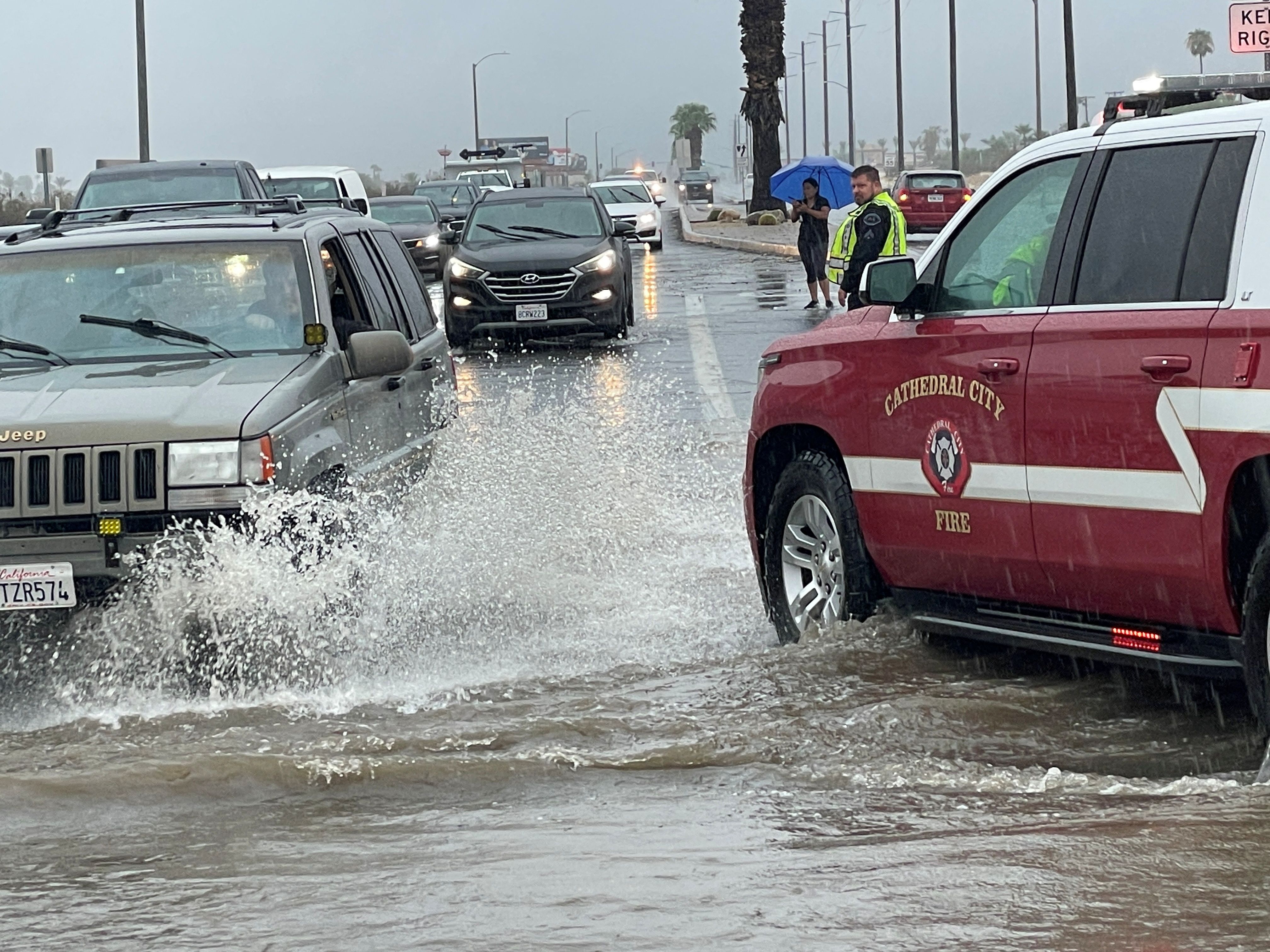
Heavy rain has deluged parts of Southern California, with forecasters warning of a “potentially historic amount of rain” and severe flooding in the usually arid part of the United States, as Tropical Storm Hilary raced in from Mexico.
One person died in Mexico amid reports of flash flooding in the Baja California peninsula, where some roads were swept away and images on social media showed torrents of water gushing down city streets that had been turned into rivers.
As of Sunday afternoon in southern California, Hilary had sustained maximum winds of 95 kilometres per hour (60 miles per hour). The storm, an exceedingly rare event for Southern California, was moving at 37 km/h (23 mph).

California Governor Gavin Newsom declared a state of emergency for much of Southern California, with flash flood warnings in effect throughout a region more accustomed to drought.
Shortly after, the National Weather Service downgraded the hurricane to a tropical depression. Still, forecasters warned mountain and desert areas could get 5 to 10 inches (12 to 25 cm) of rare rain, as much as the deserts typically see in a year.
In a White House statement, US President Joe Biden said the federal government had deployed emergency teams and resources ahead of the storm and his administration “stands ready to provide additional assistance as requested. I urge people to take this storm seriously, and listen to state and local officials”.
Potentially historic amount of rainfall is expected to cause life-threatening to locally catastrophic flash, urban, and arroyo flooding including landslides, mudslides, and debris flows. Among other preparations, remember that driving through flooded roadways is NOT be an option. pic.twitter.com/FN88Rl24LX
— National Weather Service (@NWS) August 20, 2023
In Palm Springs, about 160km (100 miles) east of Los Angeles, forecasters said the city could get between six and 10 inches (15-25 cm) of rain from the storm. The city usually gets about 4.6 inches (12 cm) of rain in an entire year.
Newsom, on a tour of Southern California, said Palm Springs was dry when he left on Sunday but an hour later it had received “the most significant rainfall over a 60-minute period any time in the history of Palm Springs”. The streets were soon flooded.
“That’s how quickly this system is moving. Take nothing for granted,” Newsom told a news briefing in Los Angeles after updating Biden on the situation.
Floodwaters raced through the concrete banks of the Los Angeles River, which normally contains barely a trickle. Hundreds of flights in San Diego, Las Vegas and Los Angeles were cancelled, professional sporting matches rescheduled and many schools cancelled Monday’s classes.
Amid all the storm preparation, a 5.1-magnitude earthquake rocked the city of Ojai, about 129km (80 miles) northwest of Los Angles. There were no immediate reports of injuries.
Hilary made landfall on Sunday in the northern part of Mexico’s Baja California peninsula, where nearly 1,900 people were evacuated to shelters, according to the country’s army. The storm’s centre was expected to move quickly across Nevada on Monday, with the storm forecast to dissipate later in the day, the weather service said.
The storm was especially dangerous in low-income areas where housing is often poorly built.
“We’ve always been aware that it’s a risky area. A lot of water runs (nearby) but what are we going to do? It’s the only place we have to live,” said Yolanda Contreras, living in a flood-prone area of Rosarito, south of the US-Mexican border.

Around the coastal town of Mulege, on the eastern side of the Baja California peninsula, one person died after his family was swept away while crossing a stream on Saturday. Phone lines and electricity were cut in several of the surrounding villages after lamp posts fell, the Mexican army said.
Hilary had initially been designated Category 4 – the second-most powerful on the five-step Saffir-Simpson hurricane scale – but weakened as it headed towards the densely populated Mexican border city of Tijuana.
Nancy Ward, the director of the California Governor’s Office of Emergency Services, said Hilary could be one of the worst storms to hit the state in more than a decade.
“Make no mistake,” she told a press conference on Saturday. “This is a very, very dangerous and significant storm.”
Hurricanes hit Mexico every year on both its Pacific and Atlantic coasts. Although the storms sometimes affect California, it is rare for them to strike the state with much intensity.
Scientists have warned that storms are becoming more powerful as climate change makes the world warmer.







